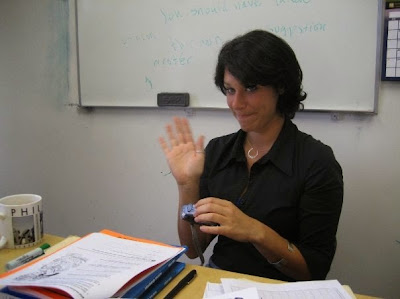Teaching A Broad
What do you call someone who speaks TWO languages?
Bi-lingual.
What do you call someone who speaks THREE languages?
Tri-lingual.
Q: What do you call someone who speaks ONE language?
American.
 |
| My Early Days as an ESL Teacher, 2009 |
I used to think that people from Switzerland spoke a language called Swiss.
I always figured that people from Brazil spoke Spanish.
I always figured that people from Brazil spoke Spanish.
"Chinese" was a blanket term for anyone who looked or sounded Asian.
I was a regular Yankee Doodle Dumbbell.
And there I was, on my first day of work, standing in front of a room full of strangers from all over the world, none of whom spoke English. My job was to make them all talk.
I was a regular Yankee Doodle Dumbbell.
And there I was, on my first day of work, standing in front of a room full of strangers from all over the world, none of whom spoke English. My job was to make them all talk.
Speaking English has always been so easy for me. Piece of cake, right? If I had known that day that I was about to get myself into, I might not have gone through with it. I was halfway through college with limited knowledge, and I was about to wrestle with one of the most convoluted, irregular, exception-ridden languages in the world.
Some of my classes had given me a basic textbook understanding of grammar, syntax, and pronunciation. What it did not prepare me for were the culture clashes, emotional outbursts, and candid situations that can occur in a multinational classroom when things get lost in translation.
Where does one start?
Do you start with grammar and rules? Or vocabulary? What about writing and reading? And what good is all that without pronunciation!? It's enough to make the teacher crazy, much less a student!
Where does one start?
Do you start with grammar and rules? Or vocabulary? What about writing and reading? And what good is all that without pronunciation!? It's enough to make the teacher crazy, much less a student!
Seven years in to the profession now, I'm happy to say that I've lost a lot of my ignorance and gained a great deal of knowledge about English mechanics.
I know why we use the past perfect and can tell you if a verb is transitive or intransitive. I can identify stressed and unstressed syllables, and explain why we shouldn't split infinitives, but boldly do it anyway.
I now know that Swiss people speak Swiss German, French, or Italian.
I know Brazilians speak Portuguese, not Spanish.
And I can even tell the difference between Chinese and Japanese people. Do you know how I do it? By smiling and asking them their names.
That's how it starts.
I know why we use the past perfect and can tell you if a verb is transitive or intransitive. I can identify stressed and unstressed syllables, and explain why we shouldn't split infinitives, but boldly do it anyway.
I now know that Swiss people speak Swiss German, French, or Italian.
I know Brazilians speak Portuguese, not Spanish.
And I can even tell the difference between Chinese and Japanese people. Do you know how I do it? By smiling and asking them their names.
That's how it starts.
 |
| Aloha and Konnichiwa! Honolulu, Hawaii, 2011 |



Comments
Post a Comment